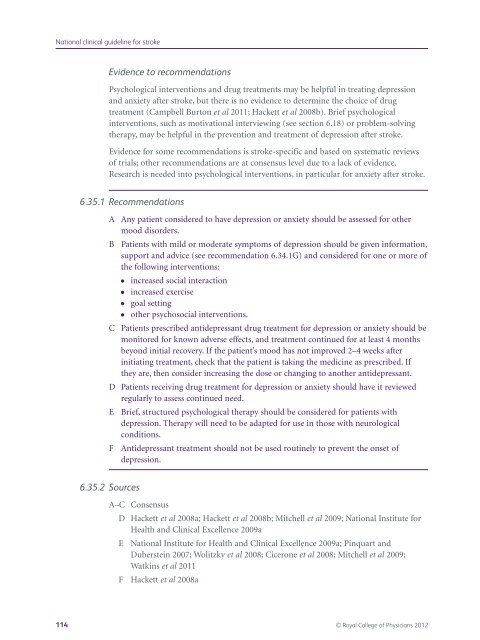national-clinical-guidelines-for-stroke-fourth-edition
national-clinical-guidelines-for-stroke-fourth-edition
national-clinical-guidelines-for-stroke-fourth-edition
You also want an ePaper? Increase the reach of your titles
YUMPU automatically turns print PDFs into web optimized ePapers that Google loves.
National <strong>clinical</strong> guideline <strong>for</strong> <strong>stroke</strong><br />
Evidence to recommendations<br />
Psychological interventions and drug treatments may be helpful in treating depression<br />
and anxiety after <strong>stroke</strong>, but there is no evidence to determine the choice of drug<br />
treatment (Campbell Burton et al 2011; Hackett et al 2008b). Brief psychological<br />
interventions, such as motivational interviewing (see section 6.18) or problem-solving<br />
therapy, may be helpful in the prevention and treatment of depression after <strong>stroke</strong>.<br />
Evidence <strong>for</strong> some recommendations is <strong>stroke</strong>-specific and based on systematic reviews<br />
of trials; other recommendations are at consensus level due to a lack of evidence.<br />
Research is needed into psychological interventions, in particular <strong>for</strong> anxiety after <strong>stroke</strong>.<br />
6.35.1 Recommendations<br />
A Any patient considered to have depression or anxiety should be assessed <strong>for</strong> other<br />
mood disorders.<br />
B Patients with mild or moderate symptoms of depression should be given in<strong>for</strong>mation,<br />
support and advice (see recommendation 6.34.1G) and considered <strong>for</strong> one or more of<br />
the following interventions:<br />
● increased social interaction<br />
● increased exercise<br />
● goal setting<br />
● other psychosocial interventions.<br />
C Patients prescribed antidepressant drug treatment <strong>for</strong> depression or anxiety should be<br />
monitored <strong>for</strong> known adverse effects, and treatment continued <strong>for</strong> at least 4 months<br />
beyond initial recovery. If the patient’s mood has not improved 2–4 weeks after<br />
initiating treatment, check that the patient is taking the medicine as prescribed. If<br />
they are, then consider increasing the dose or changing to another antidepressant.<br />
D Patients receiving drug treatment <strong>for</strong> depression or anxiety should have it reviewed<br />
regularly to assess continued need.<br />
E Brief, structured psychological therapy should be considered <strong>for</strong> patients with<br />
depression. Therapy will need to be adapted <strong>for</strong> use in those with neurological<br />
conditions.<br />
F Antidepressant treatment should not be used routinely to prevent the onset of<br />
depression.<br />
6.35.2 Sources<br />
A–C Consensus<br />
D Hackett et al 2008a; Hackett et al 2008b; Mitchell et al 2009; National Institute <strong>for</strong><br />
Health and Clinical Excellence 2009a<br />
E National Institute <strong>for</strong> Health and Clinical Excellence 2009a; Pinquart and<br />
Duberstein 2007; Wolitzky et al 2008; Cicerone et al 2008; Mitchell et al 2009;<br />
Watkins et al 2011<br />
F Hackett et al 2008a<br />
114 © Royal College of Physicians 2012


